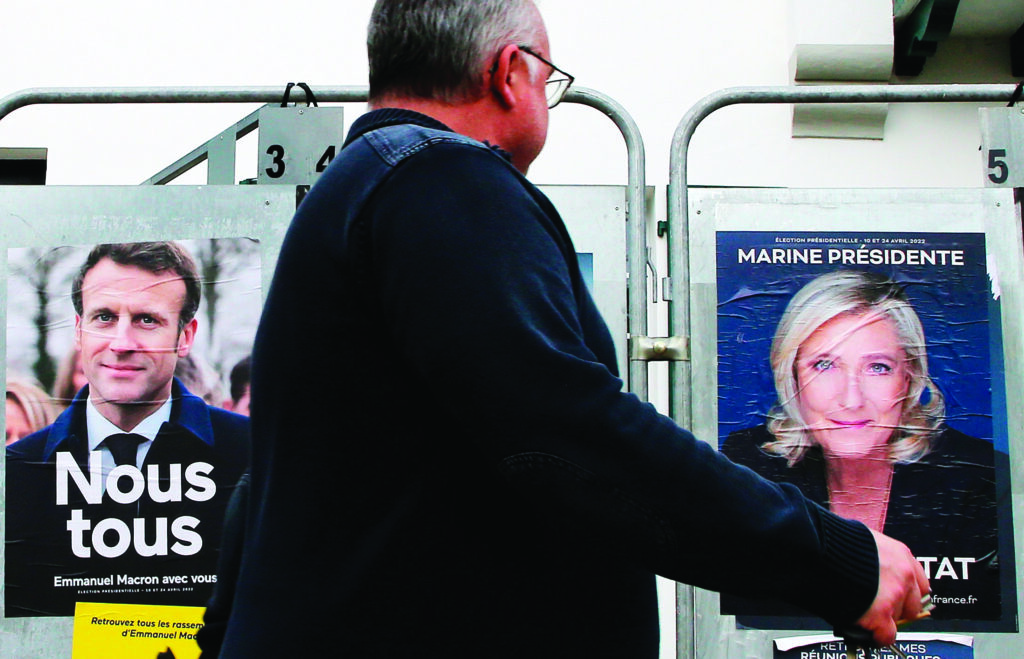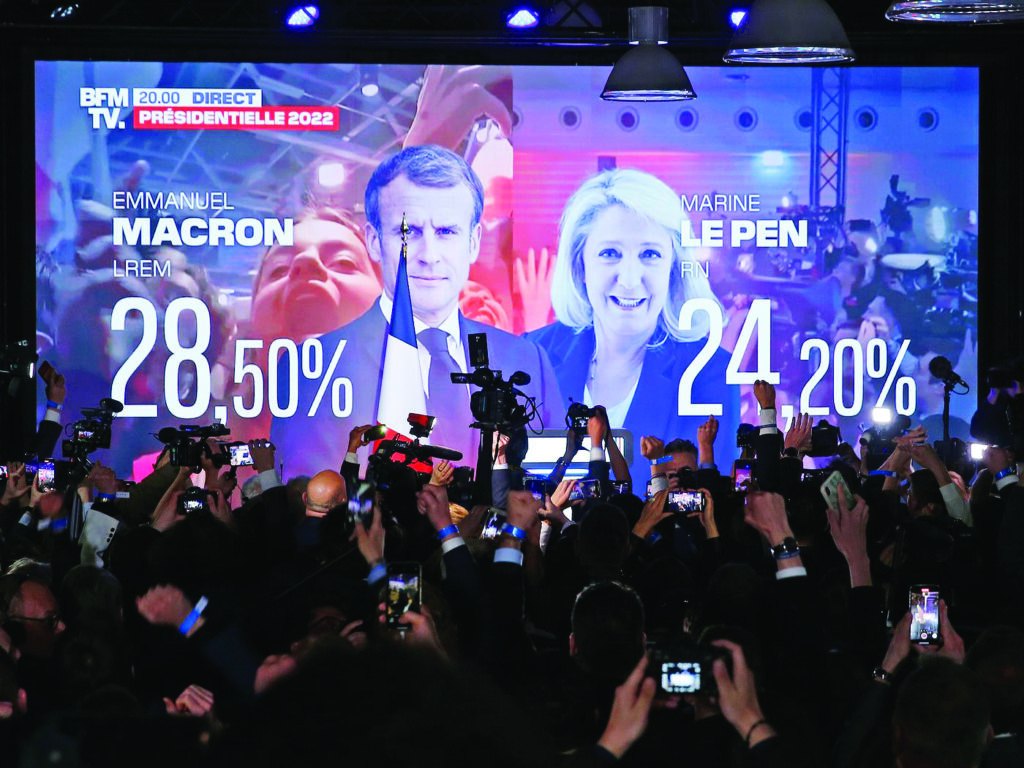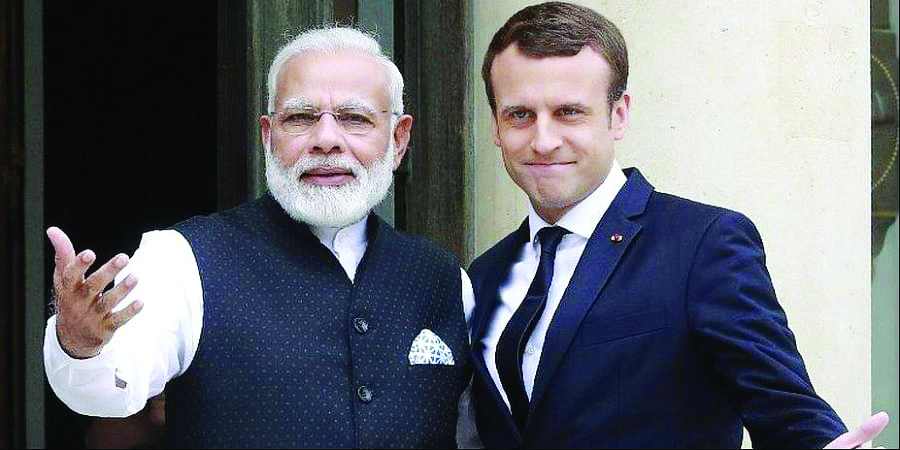Emmanuel Macron has pocketed a grand second Presidential term election win, a highly turbulent global political environment awaits his stellar contribution to bringing about eluding peace in the Russia-Ukraine war
By M R Dua
- Religious freedom has emerged as a pivotal issue in modern France
- It’s only the second time since 2002 that the sitting French President has returned as a winner
- Environment and climate change will be Macron’s herculean task for the second term
- French voters view issues, such as the record immigration, particularly of Muslims from the Middle-East
MUCH before the first round of the French Presidential election was being conducted on April 10, 2022, it was widely foretold that the sitting President Emmanuel Macron will be the star contestant, and emerge as the ultimate winner. It was only hoped that Macron’s rather abrasive, allegedly arrogant governing style would not be a roadblock in his confident race to the Elysee Palace, the French Presidential mansion, for the next five years.
Meanwhile, before the results, it was averred that if Macron is the prized winner, his close rival candidate, the far-right leader, Marine Le Pen, will bite the dust for the third time running. Marine Le Pen was also Macron’s 2017 Presidential poll rival contestant. Here, it’s relevant and necessary to clarify that under the French law, the Presidential election is held in two rounds among the top two candidates from among those filing their nominations, and winning the first two in the second round.
For the 2022 poll combat, Emmanuel Macron and Marine Le Pen, voted first two on April 10, and the final round on April 24. Macron won the second round hands down and triumphed as the next President of France. However, the exit polls had also predicted Emmanuel Macron’s win. With his final vote tally of 58.2% against his rival Marine Le Pen’s 41.8%, Macron was elected President on April 24. Incidentally, it’s only the second time since 2002 that the sitting French President has returned as the winner.
MACRON VERSUS MARION

Both the candidates, Emmanuel Jean-Michel Frédéric Macron and Marion Anne Perrine “Marine” Le Pen campaigned actively crisscrossing the country far and wide. Though Emmanuel Macron was the last to hit the campaign trails, he spoke mainly about the current national and global issues. He frequently mentioned the various contours of French policies to be in tune with European concerns. He prominently underlined that he would place forces in command of the European Union’s leading military power, and a key member of NATO with more than 800 French forces deployed in the France alliance countries near Ukraine.
In France, Muslims form the largest Islamic community in Western Europe with a 6 million-strong Muslim community, nearly 10% of the 7.7 million French population
This policy, Macron is believed to have said, would bestow France a role ‘in shepherding EU’s sanctions as the holder of the Block’s rotating presidency through June, and leader of its second-biggest economy.’ But does not find any support of Le Pen, as she has condemned the Russian invasion of Ukraine recently, though she had earlier tried to ‘befriend’ Russia’s Vladimir V Putin, but was seen to have revised her views in the current nerve-shaking devastations occurring in the ongoing Ukraine-Russian war.
Meanwhile, the French voters’ views on the all-consuming burning issues, such as the record immigration, particularly of the Muslims from the Middle East. The soaring tax rates on fuel and other essential commodities led to the highest inflation levels, and sparse financial aid especially for the poor people and the low-paid employees. In addition, geographical issues like Covid-19, and problems and large concerns emerging in the post-covid-19 period have not been swiftly and less competently handled by the Macron regime.
In this context, the 2018 widespread Yellow Vest protest on green posturing has continued to simmer. However, the French and international media have generally lauded Macron’s management and ability to the superintendence of the pandemic crisis. Even the former French President, Nicholas Sarkozy, commended Macron for his work during the pandemic, and the aftermath of ‘mammoth vaccine’ delivery and several other programmes. Macron’s multiple announcements during his campaign speeches that the public pension would be raised from 62 to 65 have been largely welcomed, though apprehensions were ventilated that such steps will lead to the already-mounting inflation, and cause all-around consumer grief.
As Macron can now brag about several small wins to be rewarded with a landslide electoral triumph to become the nation’s first youngest President in 2017, and a resounding second victory in the 2022 Presidential race. Besides now courting the voters’ support for a win in his second electoral battle, Macron can cite numerous moderate successes of the French economy. Despite the rapid rise in voting numbers, both Macron and Le Pen, the sitting President Macron has the advantage to derive from his record victory in the 2017 fight, and his above-average stellar governance during the last five years.
French Presidential Election: A Tight-Corner Bitter Fight
Jean-Michel Fredrick Emmanuel Macron, 50, a centrist, termed to be a ‘liberal socialist democrat’, was originally with the French Socialist Party, is now labelled as ‘centrist liberal President for the rich,’ who favours a free market economy and an open-door policy
ACCORDING to the election law of France, in normal times, the President of the French Republic is elected directly by the people once in five years under Article 7 of the constitution. If no candidate secures an absolute majority of votes, that is more than 50% in the first round, the second round is held within 15 days of the first round. In the first round, while all contenders face the voters, in the second round, only the top two winners confront the electorate. In the 2022 Presidential election’s first round on April 10, out of 12 contenders, Macron led all his adversaries by securing the highest tally of nearly 29% votes, against Le Pen, the second-highest figure.

Incidentally, in the 2017 Presidential poll, Macron had beaten her securing 27.8% to 22.9%. The current contest voting trend betrayed ample change in the electorate’s views for Le Pen. However, since 2002 when the direct election was introduced, all Presidential elections have been held in two rounds to decide the winning Presidential candidate. As the first round of the 2017 Presidential election was held on April 23, it was followed by its second round on May 7, 2017. Consequently, for the 2022 Presidential poll, the first round was held on April 10, 2022, and the second round was due on April 24, 2022. During the fierce campaign lasting several months, Marine Le Pen was the feisty opponent of France’s sitting President, Emmanuel Macron, who had already faced her five years ago, and resoundingly defeated her.
While Jean-Michel Fredrick Emmanuel Macron, 50, a centrist, termed to be a ‘liberal socialist democrat’, was originally with the French Socialist Party, is now labelled as ‘centrist liberal President for the rich,’ who favours a free market economy and an open-door policy.
Marine Le Pen, 57, a single mother of three, belongs to The Rassemblement National (National Rally) Party, earlier called the National Front. She wants France to withdraw from NATO’s military command. For, she’s said to opine that it ‘undermines the country’s sovereignty, by placing French troops under NATO commanders, and threatens to draw France into unwanted conflicts.’ Moreover, of the remaining 10 Presidential hopefuls, only the reputed French television anchor, now far-right Eric Zemmour, harvested 7.3% votes, while yet another contestant, Jean-Luc Melenchon, who bagged the third position, urged his followers to vote for Le Pen.
CANDIDATES PROMISES GALORE
During the electoral campaign, candidates raked up many controversial issues in which France was an active participant, such as the Russian-Ukraine war, Paris’s diminishing role in the European Union, and Europe’s common currency, the euro. In his rather unimpressive, shaky win in the second round, Macron took his campaign seriously and declared on April 16 that “the politics that I’ll carry out in the next five years will be environment, or will not be.’’ Environment and climate change will be Macron’s herculean task for the second term. Earlier, Macron had also unveiled a “multibillion-euro-plan to tackle crime and poverty.’’ At the risk of being sarcastically termed as ‘rich people’s President’, Macron also vowed to review the retirement age from 62 to 65 and increase the minimum monthly pension to 1,100 euros to benefit more ageing people. He brushed aside as ‘mere fantasy’ some of Le Pen’s promised tax concessions, but pledged to introduce several new ‘pro-business policies.’
A growing Muslim presence in France is seen by the extreme rights as a mortal threat to the French identity; this view has gained a foothold in the political mainstream

Besides this, he also promised to lure jobs, investments and industrial projects from foreign companies, and create hundreds of thousands of jobs. Though deemed ‘even unpopular’ among his critics, Macron was credited to represent ‘continuity’, while Le Pen was branded as the ‘candidate of chaos.’ Meanwhile, Macron has affirmed to increase the minimum wage; companies have asked to grant workers ‘purchasing power bonuses’ of up to 3,000 euros annually, free of tax. Liberal financial subsidies for energy and gas bills have been assured. His economic policies aimed at full employment.
However, of late, Le Pen’s noticed to have radically transformed her priorities for the wider public good; she supported a raise of ‘10 per cent in France’s monthly minimum wage of euro 1,603; she had also promised to slash sales taxes to 5.5% from the current 20 per cent on fuel, oil, gas and electricity, and to reduce taxes on 100 essential commodities. In addition, Le Pen had promised that workers under 30 would be exempt from income tax.
Besides, young couples would be eligible for interest-free housing loans. Le Pen’s ‘France-first’ policy had vowed increased spending on social programmes, and spending billions on the social welfare of ‘foreigners’, will encourage French businesses to collaborate with foreign companies to invest in France, and urged French entrepreneurs who have invested abroad to return and invest in France. She announced abandoning the ‘Frexit’, exiting the EU, and exempting applications to EU’s laws on internal free trade. Therefore, not surprising that Le Pen’s recent announcements had rekindled her victory hopes, and made her soften her attitudes ‘presenting herself as a warm, even folksy woman who loves her cats.’
ISSUE OF IMMIGRATION
Immigration is another pivotal issue on which, however, none of the two contenders articulated concrete contours. But while Macron’s ‘tough stance on immigration and Islamic extremism’ amounted to recycling the fears of the right, there was indirect credence to Le Pen’s views. Throughout their campaign trail, Emmanuel and Le Pen were completely at their wit’s end regarding the complexities of the immigration enigma. This is bound to be the toughest dilemma posed by pivotal Islamic issues posed by the 6 million-strong Muslim community, nearly 10% of the 7.7 million French population, and over 4.5 million voter-count. In France, Muslims form the largest Islamic community in western Europe.

France has had a troubled relationship with Islam because of its colonial history and several jihadist terror attacks in recent years. Religious freedom has emerged as a pivotal issue in modern France. France’s recently-enacted laws designed to combat ‘Islamist separation,’ and closing mosques, and Islamic associations have not found favour at large; the situation continues to be clouded. Ban on wearing a headscarf in public by Muslim women is widely resented, and attempts to stop it are said to have failed.
Though deemed ‘unpopular’ among his critics, Macron was credited to represent ‘continuity’, while Le Pen was branded as the ‘candidate of chaos’
Moreover, a growing Muslim presence in France is seen by the extreme rights as a mortal threat to the French identity; this view has gained a foothold in the political mainstream. Le Pen who had been accused of ‘undermining the principles of laïcité – effectively state-backed secularism — and the constitution’ if the proposed headscarf enforced, she would be ‘discriminating among believers.’ But Le Pen believes, there would be ‘no difficulty in applying the ban, and fining women who wear headscarves than there is enforcing the use of seatbelts.’
She has also threatened ‘to ban the ritual slaughter of animals required for the production of halal and kosher meat, a position rejected by Macron, as heralding a France where Muslims and Jews would be unable to eat, as their religions instruct.’ Muslims and Jews deem such measures to be a ‘serious attack on the free practice of religion that is a foundation of the French constitution.’ If such religious practices are disallowed or banned, then ‘Islam and France will be incompatible’ and a grave danger to peace and tranquillity.
Nevertheless, many knowledgeable voters see Marine Le Pen ‘as an authoritarian whose deeply racist, and Islamophobic politics threaten to turn France into an outright illiberal state. Le Pen remains as dangerous as ever,’ wrote Rim-Sarah Alouane, a French-Muslim young woman scholar, recently in a US newspaper. Alouane added: ‘Muslims have in recent decades been viewed as an internal threat.’ Thus, ‘to be a Muslim was to be guilty until proved innocent. Muslims have borne the brunt of bigotry that might pose a danger to public safety.’

Unfortunately, however, some 17% vote loss shows the voters remained unconvinced. Whereas Macron’s La Republique en Marche (LREM) spokesman Roland Lescure had asserted, Le Pen’s voter-rejection has been established to be more potent than her dislike for the sitting President, though she shared it in the voters’ subconscious. Undoubtedly, Macron by being a mere investment banker and inexperienced politician has comfortably trounced his trenchant adversary. It amply portrays the unsettled intensity of the French people’s minds toward the prevailing troubled environment in the country.
As a result, many people may have abstained from voting simply due to Le Pen’s vision of la-Trump —tearing down, not building up. The EU’s anti-fraud body has allegedly accused Le Pen of massive embezzlement. Meanwhile, as Emmanuel Macron has pocketed a grand second Presidential term election win, a highly turbulent global political environment awaits his stellar contribution to bringing about eluding peace in the Russia-Ukraine war.
Emmanuel Macron has pocketed a grand second Presidential term election win, a highly turbulent global political environment awaits his stellar contribution to bringing about eluding peace in the Russia-Ukraine war
Thus, Macron’s victory would surely have a ripple effect across the globe. The EU needs drastic reforms in its overall architecture that Macron can bring about post-haste. Finally, as the news agency, Associated Press has reported, the election outcome will have wide international influence as Europe struggles to contain the havoc wreaked by the Russia-Ukraine war. Macron has strongly supported EU sanctions on Russia, while Le Pen was worried about their impact on French living standards. Macron also is a firm supporter of NATO and close collaboration among the EU’s 27 members. Much reform could be effected in the EU’s structure. So, an anxious world waits to see how Macron’s magic approach helps to be an angelic force of peace to end the destructive Russia-Ukraine war.
How Modi-Macron ties will shape India-France future cooperation
India sees France as its ‘main partner in the Indo-Pacific region. There’s no doubt that Indo-Friendship has treaded many significant strides in commerce and business, defence-industrialization, export-import, science and technology, research and development fields
WHENEVER India’s Prime Minister Narendra Modi meets a senior international leader, he’s prone to straight away offer an intimate ‘hug’. Modi has been seen doing this during his encounters with the French President twice. On April 24 when Emmanuel Macron, 45, won his second five-year presidential term, calling Macron his ‘friend’, Modi, flushed with a smile, said: “I look forward to continue working together to deepen the India-France Strategic Friendship.” India sees France as its ‘main partner in the Indo-Pacific region. There’s no doubt that Indo-Friendship has treaded many significant strides in commerce and business, defence-industrialization, export-import, science and technology, mega joint-research and development fields.

When French Defence Minister Florence Parly visited India last year, she reiterated France’s commitment to ‘fully support Prime Minister Modi’s vision of Atmanirbhar Bharat in a wide range of research and industrialization in advanced capabilities, based on long-standing cooperation and mutual trust.’ The Indo-French bilateral trade is said to have touched $12 billion. India has already purchased 36 Rafale fighters costing over Rs. 59,000 crore, with an additional commitment to increase co-production of defence equipment in all dominant areas. The overall French investments in India amount to over $9 billion. France is also the 7th largest foreign investor with over 1,000 Indian commercial enterprises. Indian investment in France too has expanded. With winning a second presidential term in Paris, Macron’s not too flattering or amiable disposition is bound to win him a higher pedestal in the international arena. Particularly his standing in EU affairs, NATO reform, or rejuvenating the United Nations. However, like Modi’s highly-personalised top-down style of governance, Macron too will have to chisel his rather uneasy path ingenious with ample caution. In any case, the Indo-French multidimensional relationship is expected to touch newer heights that could be ‘discreet and substantive’ during Macron’s next five-year term. And it is crucial to see how France will connect with India, especially at a time when the US and the West are preoccupied with Ukraine and thereby ignoring the Indo-Pacific.
